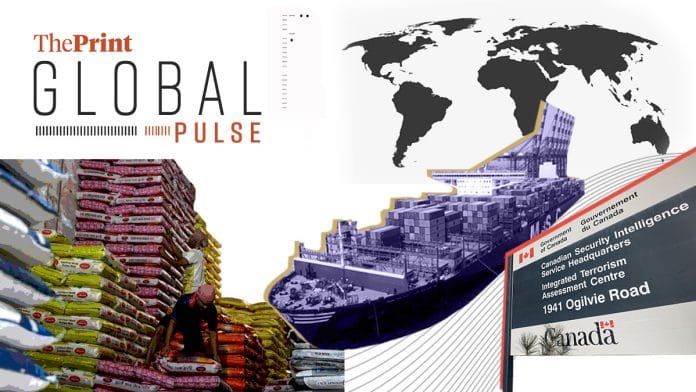New Delhi: India seems to be taking the threat of US President Donald Trump’s tariffs too lightly; so much so that ‘India’s confidence about Trump’s tariffs is deluded,’ Indian economist Mihir Sharma writes in an opinion article for Bloomberg.
India’s policymakers seem strangely confident, even optimistic. Sharma writes that there is none of the visible concern or outrage that there is in other countries. And there’s no sign of India getting special concessions yet either, especially with Trump doubling down on India being “one of the highest tariffing nations in the world” publicly multiple times.
“Perhaps New Delhi is taking comfort from the promise Trump made during Prime Minister Narendra Modi’s recent visit to Washington that a new trade deal between the two countries would be signed by the fall,” Sharma suggests. “It is of course possible that the White House wants these new levies from April as an encouragement to India’s famously refractory negotiators.”
But Sharma then points out that there’s actually a “deep pessimism that Indian manufacturing will ever be productive and efficient enough to compete on its own terms”.
Policymakers and economists alike believe India has missed the boat when it comes to manufacturing, and that there’s no point competing with other countries to even attempt to produce things more cheaply or with higher quality.
“A nation that thinks it can’t win on either cost or quality will naturally welcome a third axis,” writes Sharma. “Let other emerging economies worry that tariffs and restrictions will act as a disadvantage for them against the West’s domestic producers. Indians can hope that this additional factor acts as an equalizer for its producers when compared to the rest of the emerging world.”
India has a lot going for it, writes Sharma, from the size of its economy to its position as a geopolitical swing state. Many Indians—whether in the glass towers of Mumbai or power corridors of Delhi—believe that India is a bet worth taking.
“Our negotiators will win what we have lost on the factory floor,” writes Sharma, before adding a caveat that he doesn’t know whether this attitude will survive the year. “In this new age, like in the last, Indians will learn the same lesson: Your leaders can’t grant you some shortcut to competitive success. You still have to produce things cheaper and better to win.”
Reuters reports that ‘Canada says China and India may seek to meddle in elections’ set to take place on April 28, “while Russia and Pakistan have the potential to do so”.
Canada’s relations with both Beijing and New Delhi are icy at the moment and the Canadian Security Intelligence Service told a press conference that “hostile state actors were increasingly leveraging artificial intelligence to meddle in elections,” reports David Ljunggren.
This claim was specifically aimed at China, which Canadian intelligence believes will use artificial intelligence (AI)-enabled tools to interfere with the election.
Earlier this month, Beijing announced tariffs on more than $2.6 billion worth of Canadian agricultural and food products in retaliation to Canada putting levies on Chinese electric vehicles and steel and aluminium products last year.
Ties with India are similarly strained. “Canada last year expelled six Indian diplomats—including the head of mission—over allegations they were involved in a plot against Sikh separatists on Canadian soil,” Reuters reports.
Meanwhile, the Financial Times reports that India has lifted restrictions on rice exports in an attempt to double agricultural shipments by the end of the decade and boost economic growth.
In the report, ‘Prices slide as India unwinds ban on rice exports,’ Andres Schipani, Susannah Savage, and Humza Jilani report that India is the world’s largest rice exporter and this decision will put pressure on rival producers.
India began to crack down on rice exports in 2022 amid fears of a shortfall after prices rose because of Russia’s war in Ukraine.
“The decision comes as New Delhi seeks to increase agricultural and food exports to raise earnings and farmers’ income amid an economic slowdown in a country where the agriculture sector supports more than 42 percent of the 1.4bn population,” reports FT.
Commerce and Industry Minister Piyush Goyal said India’s goal was to ship $100 billion worth of agricultural and food goods by 2030, double the $48.15 billion shipped in 2023-24.
“India’s return to the market has come at the expense of cash-strapped Pakistan, which had enjoyed a shortlived bump as its exporters captured part of India’s market share in places such as Indonesia and east Africa,” reports FT.
India will now recapture the African market, which has long relied on India for rice exports, from countries that rushed to fill the vacuum, like Pakistan, Vietnam, and Thailand. “The surge in India exports will enable poor African countries to secure the grain at lower prices, as well as support east Asian animal feed and ethanol producers, analysts said,” FT reports.
(Edited by Sanya Mathur)
Also Read: Modi’s China remarks not as big a leap & Global Times dissects India’s manufacturing gamble






